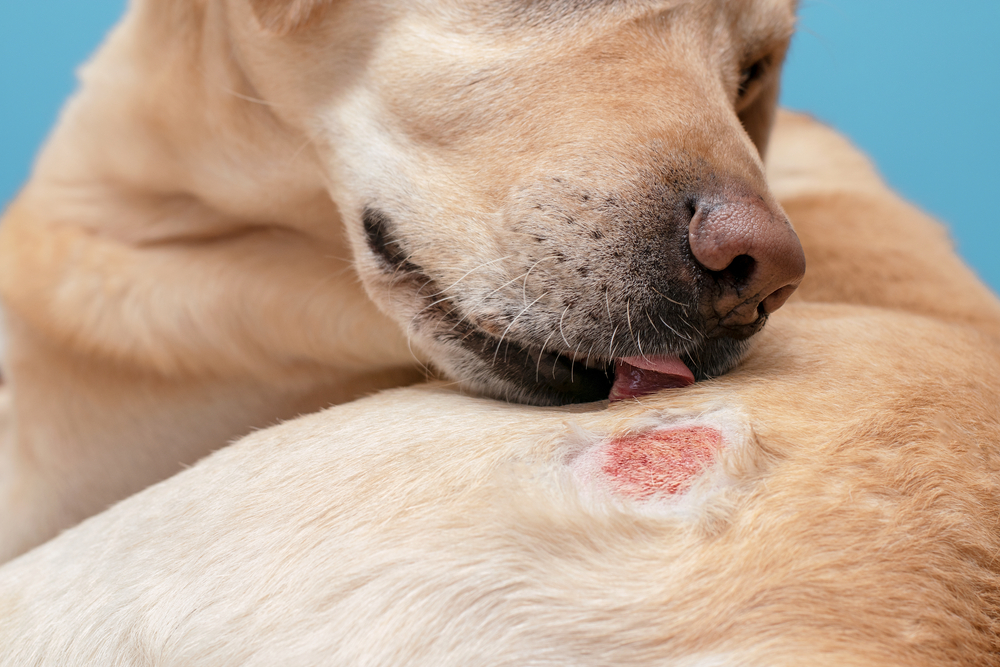Most Common Skin Conditions in Dogs
March 25, 2024

Skin conditions in dogs can be caused by a variety of factors. As a responsible dog owner, familiarizing yourself with these conditions is crucial. It will not only help you recognize the signs and symptoms but also guide you in taking appropriate action to maintain the overall well-being of your dog.
Common Skin Conditions in Dogs
When it comes to the well-being of your dog, being aware of the most common skin conditions they may encounter is essential. Familiarity with these conditions ensures that you can identify issues early and seek appropriate treatment. Here are some prevalent skin conditions that you should be aware of:
Allergies: Dogs, like humans, can suffer from allergic reactions. These can be caused by a variety of allergens such as foods, pollen, molds, and fleas. Allergic reactions often lead to itching, redness, and skin inflammation.
Parasitic Infections: Fleas, ticks, and mites are common parasites that can infest your dog's skin. These pests not only cause discomfort but can also lead to secondary infections and diseases if left untreated.
Bacterial Infections: Often a result of scratching and biting irritated skin, bacterial infections can lead to conditions such as pyoderma, characterized by sores, pimples, and skin crusting.
Fungal Infections: Ringworm is a well-known fungal infection in dogs that affects the skin, hair, and nails. It's highly contagious and can even be transmitted to humans.
Seborrhea: A condition that results in flaky skin and a greasy coat. It can be a genetic issue or a symptom of an underlying problem.
Hot Spots: Acute moist dermatitis, or hot spots, are areas of swollen, infected skin that are very painful for your dog. They often occur when your dog licks or chews an area excessively, usually in response to an itch or irritation.
Atopic Dermatitis: Chronic skin disease associated with allergies. Your dog may rub, lick, chew, or scratch at their skin leading to inflammation and secondary infections.
By keeping an eye out for these common skin conditions, you can take swift action to alleviate your dog's discomfort and prevent further complications.
Symptoms of Common Dog Skin Conditions
Recognizing the symptoms of common dog skin conditions is crucial in addressing any issues promptly. Here's what you should look for:
Itching and Scratching: One of the most obvious signs of a skin problem is an increase in itching and scratching. This could indicate allergies, parasites, or other skin irritations.
Redness and Inflammation: Red and inflamed skin can signal a range of issues from infections to hot spots. The affected area may also be warm to the touch.
Hair Loss: Unusual hair loss or bald patches can be a symptom of many skin conditions, including allergies, parasites, and fungal infections.
Odor: A bad smell emanating from your dog's skin or coat is often a sign of a bacterial or fungal infection.
Scabs and Crusting: These can appear when wounds or infections are present on the skin and are often accompanied by hair loss.
Lumps and Bumps: While not always a sign of a skin condition, any new or changing lumps should be checked by a veterinarian to rule out more serious issues.
Being vigilant and noting any changes in your dog's skin or coat can help you catch these symptoms early. Early detection is key to effective treatment and can often prevent minor issues from becoming major health concerns.
When to Consult a Veterinarian for Your Dog's Skin Condition
Knowing when to consult a veterinarian for your dog's skin condition is vital. While some minor issues can be managed at home, there are certain signs that indicate the need for professional help:
Persistent Symptoms: If your dog's skin condition doesn't improve with basic home care or if symptoms persist for more than a week, it's time to see the vet.
Severe Symptoms: Intense itching, pain, swelling, or skin changes should prompt an immediate visit to the veterinarian.
Secondary Symptoms: If your dog's skin problem is accompanied by other health issues, such as lethargy, loss of appetite, or fever, seek veterinary care.
Veterinarians can provide a thorough examination, conduct necessary tests, and prescribe appropriate treatments. They can also offer advice on long-term management of chronic skin conditions.
Prioritizing Your Dog's Health and Well-being
Your dog's health and well-being should always be a top priority. By understanding and recognizing the signs and symptoms of common skin conditions, you can play a pivotal role in maintaining your dog's health.
If you have concerns about your dog's skin condition, contact our veterinarian at Lone Oak Animal Clinic in our Paducah, Kentucky, office. Call (270) 554-0385 to schedule an appointment today.


